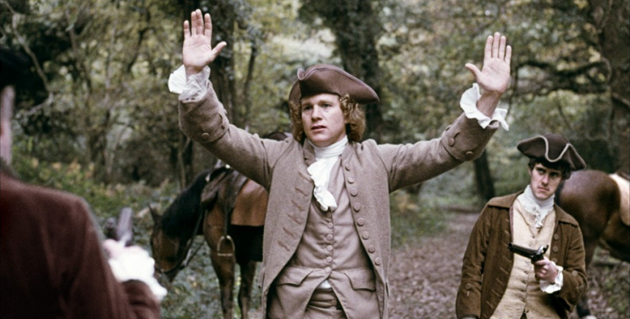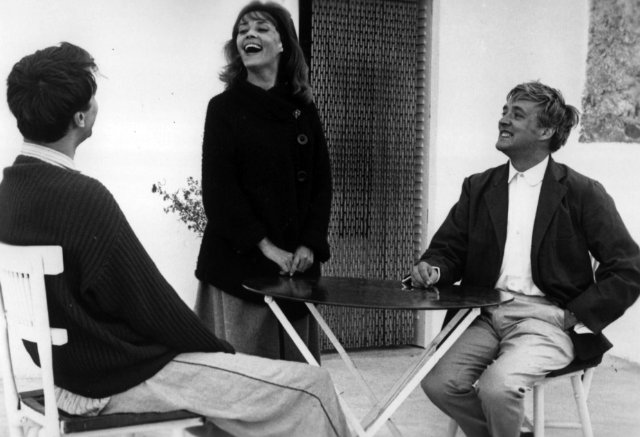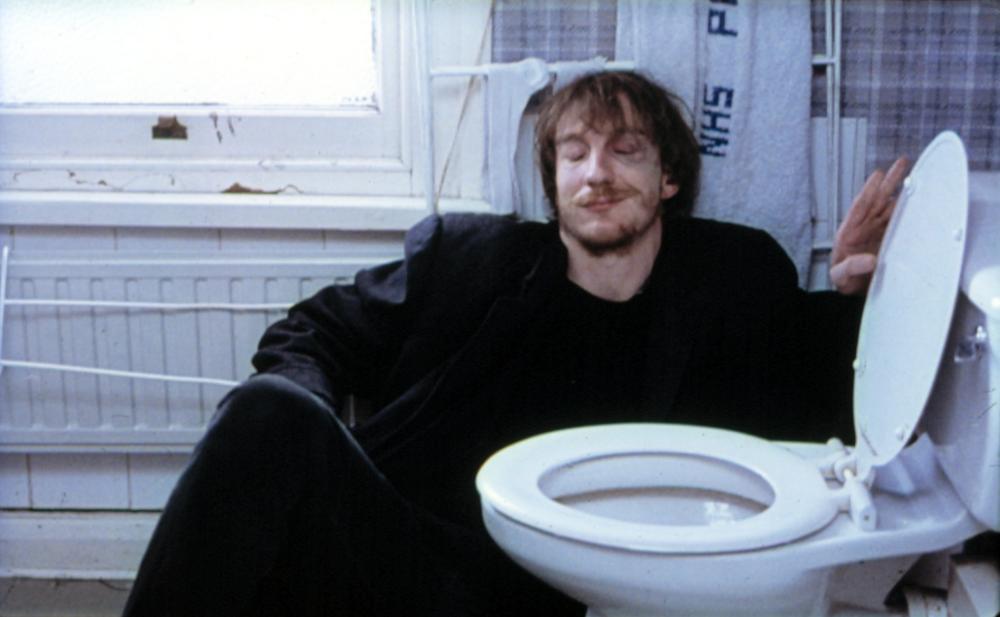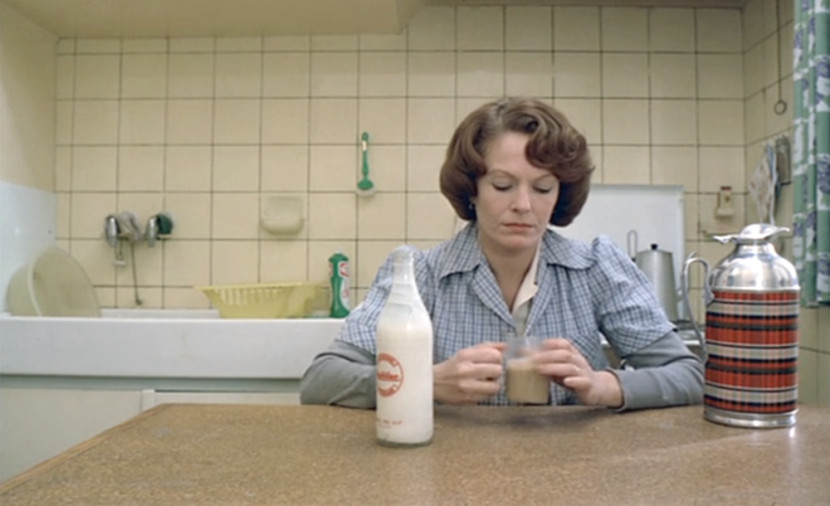5. Redmond Barry Lyndon (Barry Lyndon)

Whether the character of Redmond Barry Lyndon is supposed to be an avatar for Stanley Kubrick himself is open to debate given how both figures have expressed a difficulty with human connection. Furthermore, Barry is granted greater pathos by Kubrick when compared to the cold and disturbed protagonists that typically inhabit the director’s work. This suggests that Barry was the character Kubrick had the most empathy for, and thus saw himself the most in.
In many ways, Redmond Barry possess an adolescent understanding of intimacy as he cannot form long-lasting or substantive connections with anyone he meets. His romantic relationships tended to be fueled by superficial lust, passion or financial security, and he would switch political loyalties on the fly should they suit his pragmatic or hedonistic needs.
Though not very charismatic Barry makes up for his social deficiencies through extraordinary cunning and physical prowess. While those factors assure great social mobilityhis fallow empathy ensures that he can never be satisfied in any station of life.
This changes with the birth of Barry’s son, Bryan, the first and only person Barry truly loves, perhaps even more than himself. This “love” prompts Barry to ridiculously spoil Bryan, with Barry giving into his son’s demands for a full-grown horse, despite the danger such an animal holds for such a small child.
Bryan inevitably dies after falling off his birthday horse, going at it alone despite his father’s warnings, and thus effacing the one true connection to humanity Barry had. With the rotting of his last hold on mankind, Barry gives way to alcoholism and nihilism, even allowing himself to be shot in a duel by his vengeful stepson.
Barry is a Peter-Pan like figure that showcases the pitfalls of being bereft of the capacity to love. He may achieve great social standing and be an expert fighter and duelist, but because his social intelligence is that of an 8-year old he is doomed to misery.
Kubrick’s movies are often accused of being cold affairs though with the character of Barry, the director puts the necessity of human love at the forefront, indicating that it is a craft just as important as chicanery and gunslinging.
4. Catherine (Jules and Jim)

It’s amazing that the manic-pixie dream girl ever became a trope in the late 90s and early 2000s since “Jules and Jim” showed us how dangerous such figures could be back in 1962. Catherine, the object of affection for the titular friends, is initially presented as an energetic, breezy, worldly dream girl who will deepen the lives of our love-lorn protagonists. However, it turns out that she is an emotional vampire, a person who needs to be fed constant love and attention lest she harm herself or others.
Through Catherine’s arc, writer/director Francois Truffaut reveals the artifice in the “dream-girl” trope found in movies like “Some like it Hot” or “Garden State”. “Jules and Jim” suggests that if an extremely extroverted, playful and flirtatious individual with an intense interest to “better your life” existed in reality, they would be hiding a malignancy.
Catherine initially weds Jules, the sensitive half of the duo, though their marriage proves unsatisfactory, prompting her to constantly leave Jules for other men. She then seduces Jim, the more stoic man, and despite the two trying to work as a couple, Jim realizes that Catherine only sees people as things to be drained for emotional sustenance rather than develop connections with.
One would think after Catherine subsequently threatens Jim with a gun that he would leave her forever, yet Jim’s attraction to his fantastical idea of Catherine remains strong. He agrees to a car ride with Catherine, without Jules, at which point Catherine crashes her and Jim into a river, killing them both.
Catherine shows us how corrosive it can be to view a romantic interest as a elixir to one’s problems. While she can take on a fantastically romantic persona, Catherine, like Redmond Barry, does not really know how to love herself. She wants to be loved, is borderline addicted to it, yet she does not want to put in the emotional work to sustain relationships as she will almost always get bored and move on to someone else to shower her with superficial affection.
Catherine thankfully butchers the idealistic trope of the “dream-girl’ who only exists to love and save our sad protagonists. “Jules and Jim” show us that if such fantasies truly existed they could very much have deadly consequences.
3. Lee Shin-ae (Secret Sunshine)

Grief is a disease, one that invades your entire body and nowhere in film is that better exemplified than in the character of Lee Shin-ae, a piano teacher and single mother living in her dead husband’s home town. Lee’s grief is ever evolving; ranging from unbearable suffering, to extreme religiosity and pulsating hostility, with all the people around her only able to watch and never fully empathize.
In many ways, Lee and Laura Palmer share the same spirit since throughout their respective films they seem absolutely saturated by trauma and physiological hell. Yet Lee differs in the fury she suppresses with sorrow, exploding when she realizes that compassion had failed to bring her peace.
Lee is initially a bit stuck-up and cold when she and her son Joon move to small-town Miryang, criticizing others for their life-style and business choices not matching up to city-life standards. Yet she gradually allows herself to become integrated into the community and for a faint moment it appears she may finally find balance within herself following her husband’s death.
This lifestyle changes when Joon is kidnapped and murdered, with Lee’s peace now replaced with agony. She attempts to find solace in the Church, the one institution that appears to provide unrequited love, and in the process, becomes almost fanatically religious. The sense of community and wholeness with God provide Lee respite, yet the peace is short-lived once again.
Hoping to finally be relieved from agony, Lee decides to forgive her son’s killer by visiting him in prison. Yet she finds that the killer believes he has already been forgiven by God and that one declaration almost completely eradicates Lee’s faith in the Church. In the cruel rhythm of the universe Lee Shin-ae is not meant for peace, either of her own volition or God’s.
Writer/director Lee Chang dong and actress Jeon Do-yeong succeed in compelling the audience to feel Lee Shin-ae’s painful narrative right down to their bones. Yet they never resort to cheap dramaturgy for the sake of emotional responses. The two instead emphasize the mundanity of Lee’s life within Miryang even after her tragedy, the 9 to 5 details of the town given as much credence as Lee’s turmoil.
Lee Chang-dong’s naturalistic cinema-verite in “Secret Sunshine’s” sense of place and dialogue allow for Jeon Do-yeong to masterfully showcase her character’s complex arc through one of the truest performances ever captured on celluloid. Life in a community goes on even as one experiences great trauma, and Lee’s arc shows just how difficult and sometimes horrible it is to deal with that reality.
2. Johnny (Naked)

Johnny is an evolution of the nihilistic loner arch-type found in Travis Bickle (“Taxi Driver”) Michel (“Pickpocket”) and the aforementioned Raskolnikov. What elevates Johnny above the rest however is his psycho-sexual demeanor and the kind of self-hatred that can make you sick to your stomach.
Coupled with David Thewlis’ legendary performance, Johnny is as sick, depraved and awful as a human being gets yet it is his shocking relatability that is truly his most unnerving aspect.
Johnny hates himself because his life appears to have wasted away into vagrancy, aimlessness and brutality and he copes by viciously putting down everyone he comes across. From mocking his ex-girlfriend Louise for having a straight job to berating a night’s watchmen with predictions of the apocalypse, Johnny is a slimy bacteria seeking to infect the mammals around him with misery. His wretchedness is taken even further with his tendency to commit sexual assaults and physical abuse, factors that for all intents and purposes should stop any decent person from sympathizing with him.
Yet his loneliness and subsequent depression are often presented with strange gentleness, for when he is not hurting people he sinks into himself as though he is a grade-schooler sitting alone at a lunch table. Writer/director Mike Leigh uses Johnny as a template for the corrosive nature of depression, specifically how despair can overwhelm our entire being. Johnny’s actions are still inexcusable, yet through Leigh and actor David Thewlis’ pathos for the man we get understand the foundations behind his grisly nature.
However, Johnny is inevitably addicted to his misery for when Louise offers up the opportunity for the two to rekindle and in turn heal each other, Johnny limps back into the London streets. Johnny’s despair is intrinsic to him and he would rather endure further humiliation and aimlessness than give the corporeal misery that defines him away. Johnny will never allow himself to be saved as any emotional experience beyond suffering and self-loathing is absolutely terrifying to him.
1. Jeanne Dielman (Jeanne Dielman, 23, quai du commerce, 1080 Bruxelles)

As the focal point for one of the most ground-breaking movies of all time, Jeanne Dielman’s arc is a case-study on the creation of gender roles and how they seep into a human’s mental state. Throughout “Jeanne Dielman”, the titular protagonist does not do much beyond cooking, cleaning, watching babies and engaging in prostitution, a typical domestic existence more or less.
Yet nightly conversations with her son reveal how her routine is a manifestation of the nurturing mother/wife persona she had been cultivating since she was a young girl. It is never made explicitly clear if Jeanne ever enjoyed her routine of domesticity yet her gendered history at the very least indicates that she is subconsciously conditioned to embody the role of mother and wife for all times, even when her husband and son are not directly present in her life.
Delphine Seyrig’s performance as Jeanne ought to be eternally taught in acting schools as it showcases the numerous choices an actor can make in communicating intent and depth when engaging in mundanity.
Strained breaths, poor eye contact, the pace and head motion with which she peels a potato, an annoyed attitude when she travels back and forth between stores, all these elements are used by Seyrig to illustrate a woman beginning to break away from her conditioning. Jeanne is being suffocated by her routine, gradually coming to the realization that perhaps this life-style is seeping out her enjoyment of life.
Jeanne’s quiet tension bursts at the end of “Jeanne Dielman” when she murders one of her clientele during sex, the beginning of her open rebellion towards her socialization. The last few minutes of the movie involve Jeanne meditating on her action in the dark of night, unsure of whether she is prepared to face the consequences of her actions and thus break away from the routine that had sustained her all her life.
Writer/director Chantal Akerman captured every detail of Jeanne’s routine for if one’s entire being is domesticity, everything from coating veal in egg to scrubbing oneself in the tub become as meaningful to our heroine as the Battle of Helms Deep for Aragorn. Yet this intimacy would not have worked without Jeanne’s multifaceted characterization, whereupon we see a woman being worn down by domestic drudgery in real time yet still trying to continue, with a stiff-upper lip, the duty of womanhood.
Jeanne’s lifestyle and her attitude towards it makes us questions the means with which we were raised at birth, perhaps even fearing that we are setting up for a life of stagnant machinery for the sake of upholding tradition. Jeanne’s act of murder may be extreme, yet her mental and social prison was far too horrid to continue in, even if rejecting said prison meant burning all her learned values and way of life to ash.